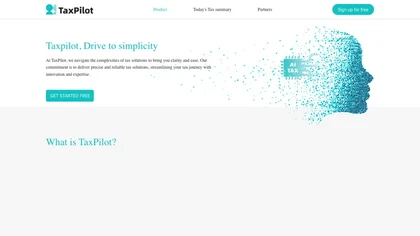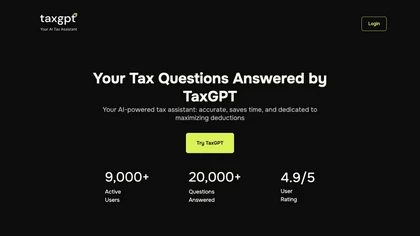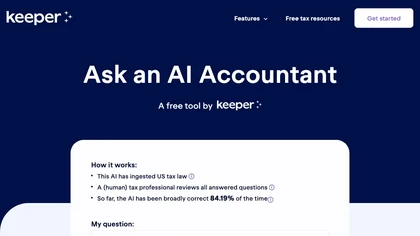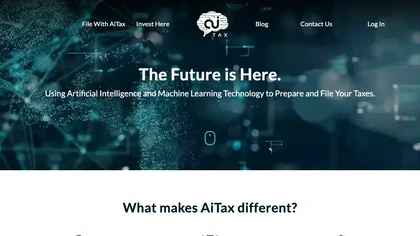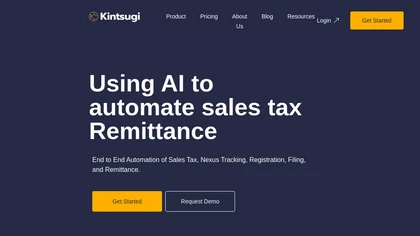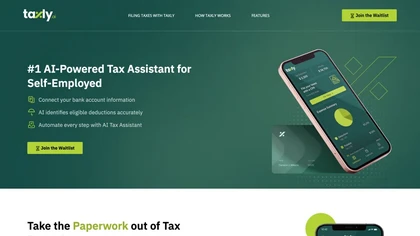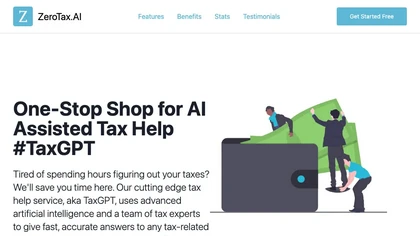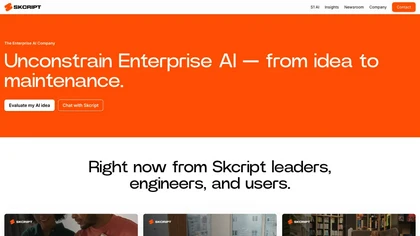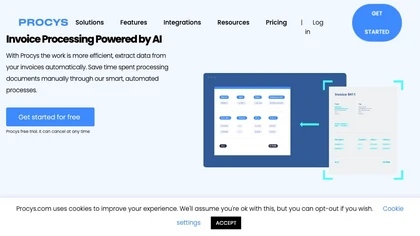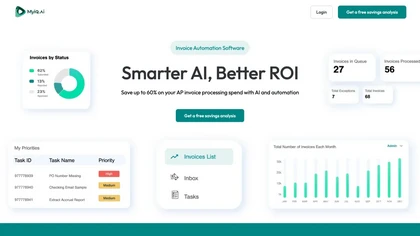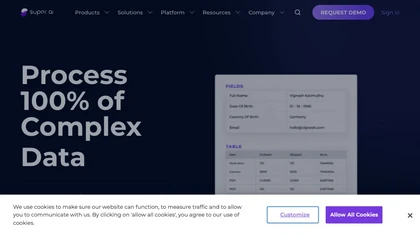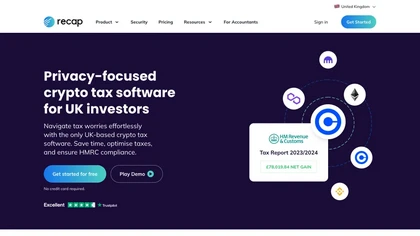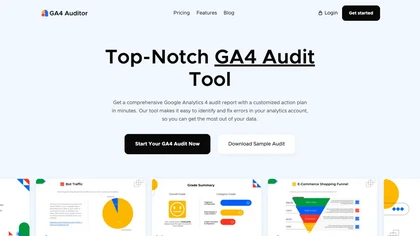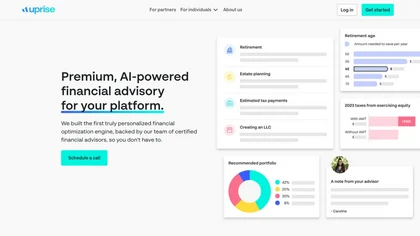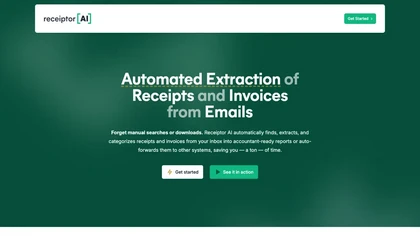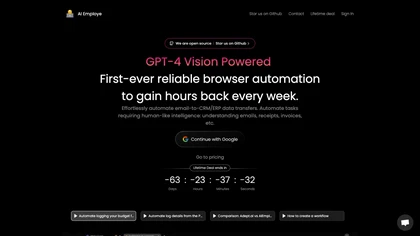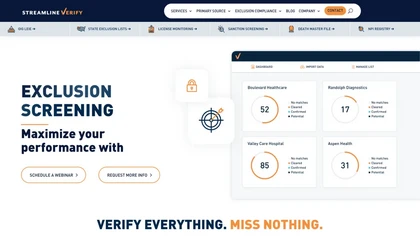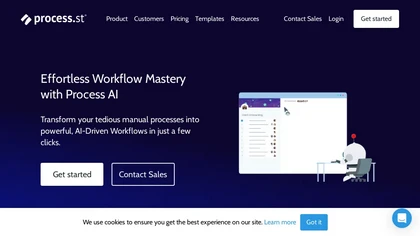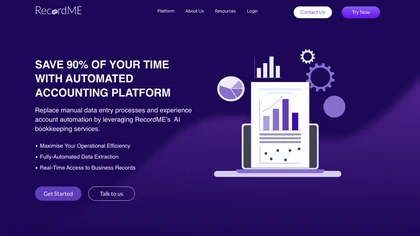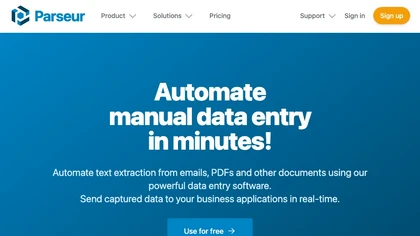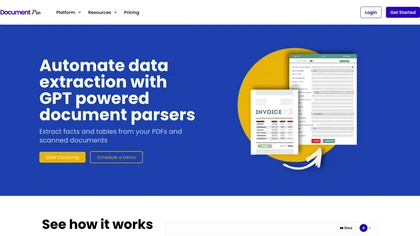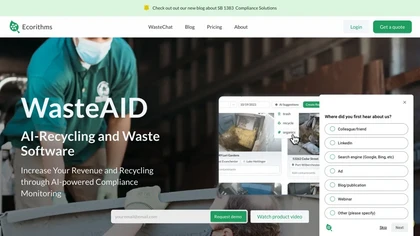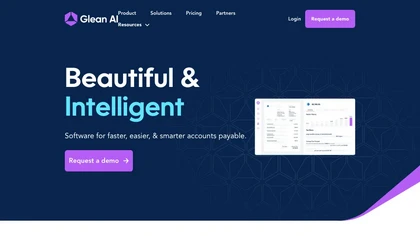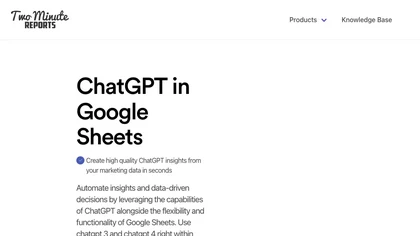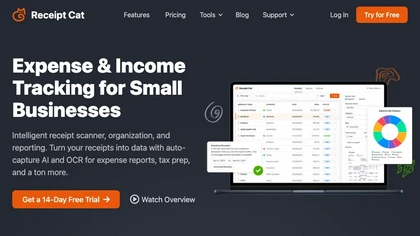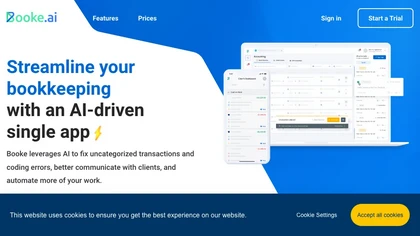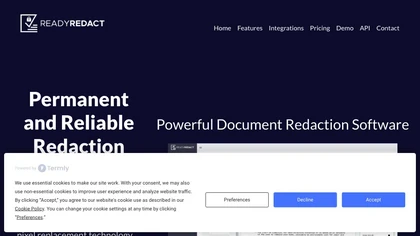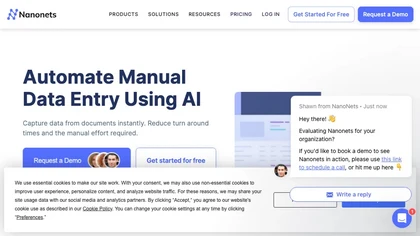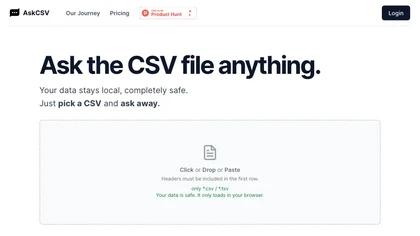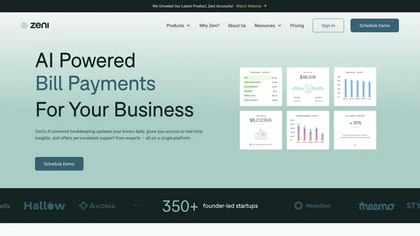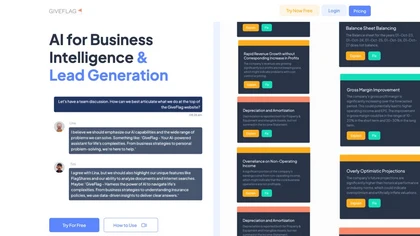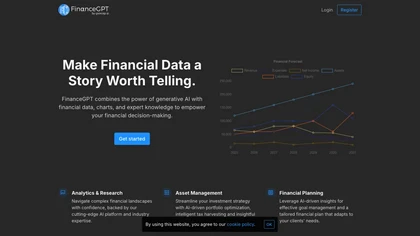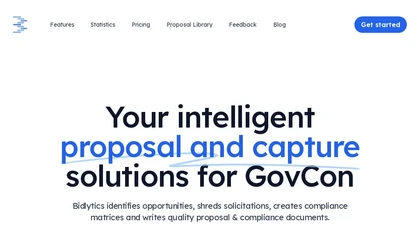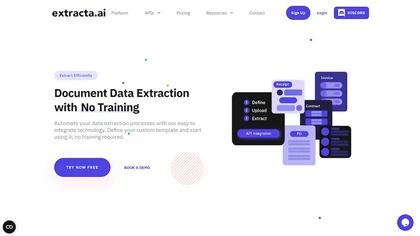AI use cases for Taxation
Generative AI can be applied in various applications for taxation. Here are some examples to explore below for inspiration with AI tools to get you started with using AI in taxation.
🛠️ 70 AI tools for Taxation
Explore a dynamic list of some of the most popular tools to get you started with various AI use cases and applications for Taxation to streamline your workflows and productivity today.
TaxPilot features
- Simplifies tax solutions for individuals and professionals
- Expertise in navigating complex tax matters
- Revolutionizes tax solution delivery through AI technology
- Provides actionable and reliable tax solutions
- AI-driven knowledge base for precise answers to tax regulations
UnitedTax.AI features
- AI-powered tax preparation
- Accurate tax return preparation
- Smarter way to handle challenging tax scenarios
- Secure portal for document upload and question answering
- Paperless file storage and digital signatures
TaxGPT features
- AI-powered tax assistant
- Chat interface for asking tax-related questions
- Ultimate tax support by maximizing deductions
- Efficient tax filing assistance 24/7
- AI trained extensively in tax laws and regulations
Keepertax features
- Ask tax questions
- Cpa fact-checking
AiTax features
- Tax preparation
- Error elimination
- Guaranteed tax amount
- Fee structure
- Legal security
Reconcile features
- Securely connect with over 9,000 banks and financial institutions
- Intake information from various accounts such as banking, bookkeeping, and brokerage
- Provide accurate tax insights
- Maximize tax savings by looking at intricate details of finances and identifying deductions, credits, and strategies specifically tailored to the user's situation and goals
- Real-time ai-tax assistance providing instant answers to queries, expert guidance, and demystifies complex tax concepts
Kintsugi features
- Automate sales tax lifecycle
- Calculate sales tax
- Track nexus locations
- Economic threshold tracking
- Filing automation
🔥
Create your account, save tools & get personal recommendations
Receive a weekly digest of our handpicked top tools.
Unsubscribe anytime
Taxly.ai features
- AI-powered tax assistant
- Automated tax filing process
- Expert CPA support
- Personalized tax reports
- Real-time expense tracking
Mesha features
- AI-driven bookkeeping and tax solution
- Powered by real human bookkeepers and CPAs
- Accurate monthly financial statements and tax filings
- Tailored insights with real-time financial reports
- Full range of tax solutions with certified tax advisors and CPAs
Simpla AI features
- Personalized tax advice in seconds
- Cutting-edge tax solutions
- AI-powered document processing for automating financial systems
- Upload financial statements for in-depth analysis
- Data security and insightful analytics
ZeroTax Al features
- Tax assistance
- Chatbot
- Call-in line
- Advanced artificial intelligence
- Fast and accurate answers
- Expert advice
- Risk-free
- 100% satisfaction guarantee
- Ai-generated tax answers
- Low-cost tax professional reviews
CanTax features
- Chatbot interface
- Personalized tax advice
- Comprehensive knowledge of tax legislation
- 24/7 availability
- Business solutions for professional firms
Decode.tax features
- Data analysis for tax optimization
- Secure storage and sharing of tax returns
- Covering various tax aspects
- Recommendations for lowering tax bills
- Option to delete information at any time
skcript.com features
- Automated processing of tax invoices
- Building AI-powered knowledge base
- Evaluating AI ideas
- Discussing feasibility and budget
- Efficiently managing complex business problems
Procys features
- Invoice extraction
- Document validation
- Automated data entry
- Digitization of invoices
AI-FraudGuard Ecommerce features
- Contactless conversion
- Fraud prevention
- Transaction monitoring
- Compliance processes automation
- Real-time monitoring
MyiQ.Ai features
- Invoice and line item capture
- Automatic data validation
- Streamlined approvals
- Accrual automation
- AI-powered OCR for global invoice formats
Fortune features
- Automated transaction categorizations
- Detailed financial analytics
- Forecasting finances across various banks worldwide
- Real-time alerts for every transaction
- Advanced transaction search capabilities
SuperAI features
- Automation of business processes
- Conversion of unstructured data to ai applications
Recap NFT Gallery features
- Track entire crypto portfolios in one place
- Automatically calculate capital gains and income taxes
- Import transactions from major exchanges like Coinbase and Binance
- Sync real-time API data
- Generate tax reports with ease
Flyfin tax features
- Tax deduction
- Eliminate 95% of work
- File taxes online
- Audit insurance
- 100% accurate tax filing
GA4 Auditor features
- Comprehensive audits for Google Analytics 4 accounts
- Detailed audit report generation
- Customized action plan creation
- Detection and resolution of tag health, performance, data integrity issues
- Implementation of best practices and actionable recommendations
GIGAMATIC features
- Financial management tools
- Cloud-based 'work wallet'
- Advanced analytics and personalized insights
- Tailored lending products and insurance plans
- Decentralized, encrypted network for data security
Client Hub features
- Cloud-based platform
- Client communication management
- Workflow management
- AI capabilities for activity visibility
- Integration with QuickBooks and Xero
Digits — Accounting features
- 24/7 automated bookkeeping
- AI Advisor for financial analysis & insights
- Intuitive Reports for non-finance professionals
- Live Finance Dashboards for easy business monitoring
- Bank-grade Security for data protection
Uprise Embedded features
- AI-powered financial advisory platform
- Personalized financial optimization engine
- Automating regulatory compliance
- Concierge services for comprehensive financial planning
- Flexible integration options and white-label solutions
Receiptor.ai features
- Automated extraction of receipts, invoices, and emails
- Contextual categorization for streamlined accounting processes
- Integration with various email accounts for efficient monitoring
- Real-time expense analytics and sync with accounting software
- Comprehensive document capture for precise financial tracking
fdo.ai features
- Financial recordkeeping simplification
- Focus on core business operations
- Suite of tools covering strategy, finance, and operations
- Intuitive accounting
- Seamless marketing solutions
Mezzi features
- Personalized steps to save on capital gains taxes
- Reduce fund fees
- Optimize portfolio allocation through advanced calculators and AI-powered suggestions
- Compare performance and allocations across different accounts for easy rebalancing
- Ad-free platform prioritizing data privacy and security
Aidaptive features
- Recommendations
- Pricing
- Search
- Merchandising
AIEmployee features
- browser automation
- email-to-CRM/ERP data transfers
- automating tasks requiring human-like intelligence
- logging in budget and email expense tracking
- creating workflows
Streamline Verify features
- Screening against various databases including OIG LEIE, state exclusion lists, license monitoring, sanction screening, death master file, and NPI registry
- One-stop portal for quick identification and resolution of compliance screening issues
- API integration for future compliance needs
- Enhances efficiency in executing exclusion screening and credential management
- Trusted by over 10,000 establishments
Process AI features
- Workflow generation
- Manage due dates and timelines
- Assign tasks to team members
- Built-in approval processes
- Document analysis
Recordme features
- Automated data extraction
- Real-time access to business records
- Invoice processing powered by OCR technology
- Seamless integration with accounting software
- Efficient file management
Out Of The Blue features
- Real-time revenue-impacting event detection
- Identification of revenue leaks and issues
- Detection of revenue-impacting infra errors and user engagement/navigation issues
- Transition from manual monitoring to AI-driven proactive approach
- Optimizing ad spends and customer communication
hCaptcha features
- Comprehensive security platform
- Instant detection and deterrence of human and automated threats
- Easy deployment with universal support
- Advanced security measures against various threats
- Privacy and compliance features to meet global standards
Parseur features
- Automated data entry
- Real-time text extraction
- Customizable templates
- Ocr software
- Structured data conversion
- Integrations with cloud applications
- User-friendly accessibility
DocumentPro features
- GPT-Powered Data Extractors
- AI-Powered OCR
- No-Code Data Extraction
- Template-based Parsing
- Automatic Date Formatting
FinCheck by Trezy features
- Financial health assessment
- Annual statements analysis
- Multilingual reports
- Privacy control
- Security features
WasteAID features
- Automatic route auditing
- Integration with existing systems
- Audit over 400k generators and 1m+ pickups
- Detect overflow incidents and identify contamination
- Tracking commercial account compliance
Glean AI features
- Automation
- Data benchmarking
- Vendor collaboration
- Invoice processing
- Deep spend insights
ChatGPT in Google Sheets features
- 1
- 2
- 3
- 4
- 5
Predict Expert AI features
- Crafting unique AI models
- Integrating intelligent applications and APIs
- Tailoring AI models and applications to address specific business needs
- Real-time operational insights
- Monitoring performance in real-time
Yepp features
- Individually tailored AI responses
- Integration with team processes
- Marketing intelligence
- Data retrieval and analysis
- Automating Tedious Marketing Tasks
Receipt Cat
2.8Receipt Cat features
- Ocr scanning
- Expense report generation
- Tax preparation
- Receipt organization
- Custom category creation
Booke AI features
- Automate bookkeeping tasks
- Auto-categorize transactions
- Expert reconciliation suggestions
- Two-way integrations with xero, qbo, and qbd
- Invoice and receipt ocr
- Real-time data extraction
- Bulk reconciliation and categorization
- Audit insights for discrepancy insights
AIGA features
- Custom-built AI agents
- Wide range of functionalities
- Over 6442 deep-automation integrations
- Immediate results and visible growth
- Solution for every department and organization
SparkReceipt features
- Receipt scanning
- Expense tracking
- Business document management
- Accountant collaboration
- Cloud access
PDF Parser features
- Uploading
- Choosing fields
- Parsing json
- Customizing output
- Customer support
SaaS Library features
- Product idea generation
- Market strategy development
- Revenue model analysis
- Persona insights
FinanceGPT Chat features
- Build custom AI co-pilots
- Semantic search for understanding
- Document upload for tailored answers
- Data source connectivity
- Personalized financial insights
Forescribe features
- Discover, analyze, and manage integrations of SaaS applications
- Provide real-time insights on SaaS usage and compliance
- Automated compliance checks for SaaS applications
- Offer cost optimization suggestions for SaaS applications
- Enhance transparency in digital landscape governance
ReadyRedact Document Redaction features
- Redacting
- Documents
- Privacy
- Data protection
- Compliance
- Gdpr
- Ccpa
- Lgpd
- Popi
- Hipaa
Shown features
- Automated ad targeting
- Automated copywriting
- Ad creatives creation
- 24/7 ad optimization
- Campaign performance monitoring
People AI features
- Account intelligence
- Opportunity management
- Engagement intelligence
- Sales insights
- Marketing insights
Nanonets features
- Invoice data capture
- Receipt data capture
- Passport and id card data capture
- Handwritten text recognition
- Image-based data extraction
Saara.io features
- Focus on solving common industry challenges
- Reduce operational costs
- Analyzing customer data for personalized offers and improved shopping experience
AskCSV features
- CSV processing in browser
- Query data
- Generate charts
- Create tables
- Data analysis
- Data security
zeni.ai features
- Automate financial data harmonization
- Access real-time insights
- Receive personalized support from experts
- Accelerate decision-making processes
- Automate bookkeeping processes
Receiptify features
- Receipt extraction from emails
- Receipt scanning via photo upload
- QuickBooks integration for transaction matching
- Automatic backup to Dropbox or Google Drive
- Download reports in zip, CSV, or PDF formats
Sheshi FR features
- Automated financial reporting
- Fully automated solution for preparing financials
- User-friendly platform
- Automation and AI technology for error reduction
- Customizable financials and automated data import
Automatica features
- Automated lead generation
- Custom lead qualification
- Personalized cold outreach
- Meeting bookings
- Seamless integration with existing systems
GiveFlag features
- Analyze various documents such as business intelligence reports, form 10-K filings, policy analysis, contracts
- Extract relevant information from sources like academic papers, privacy policies, insurance reviews
- Automate administrative and transactional tasks
- Train GPT-based engines with expert knowledge
- Ensure data security with restricted access to files and chat messages
FinanceGPT features
- Generative AI technology
- Customizable financial forecasting
- Real-time data aggregation
- Advanced analytics
- Targeted towards investors, financial managers, and accountants
AnythingLLM features
- One-click Installation
- Runs locally
- Fully private
- Custom models integration
- Documents ingestion support
Bidlytics - AI for GovCon features
- Enhanced Privacy & Security
- Seamless Bid Discovery
- Automatic Solicitation Shredding
- Compliance Matrix on Autopilot
- Fast & Accurate Proposal Generation
Flagright AI features
- Real-time transaction monitoring
- Case management
- Automated end-to-end solutions
- AI forensics for investigating suspicious activities
- Customer risk assessment automation
Extracta.ai features
- Advanced OCR System
- Fine-tuned Model for data extraction
- Seamless API integration
- Competitive pay-as-you-go pricing model
- Up to 99% accuracy without prior training
DemandsAI features
- Teams Permissions model for managing staff access
- Customized Settlements tab for managing and calculating settlement details
- Enhanced conflict checker for addressing potential conflicts
- SidebarAI as a personal AI Assistant for chat conversations and guidance
- AIFields for instant legal document analysis and insights
Unfig features
- Automated data capture from various logistics documents
- Universal TMS integrations for seamless connectivity
- Embeddable customer dashboards for real-time data insights
- Scraping information from numerous sources for visibility into logistics data
- Streamlining logistics operations with unprecedented speed and efficiency
